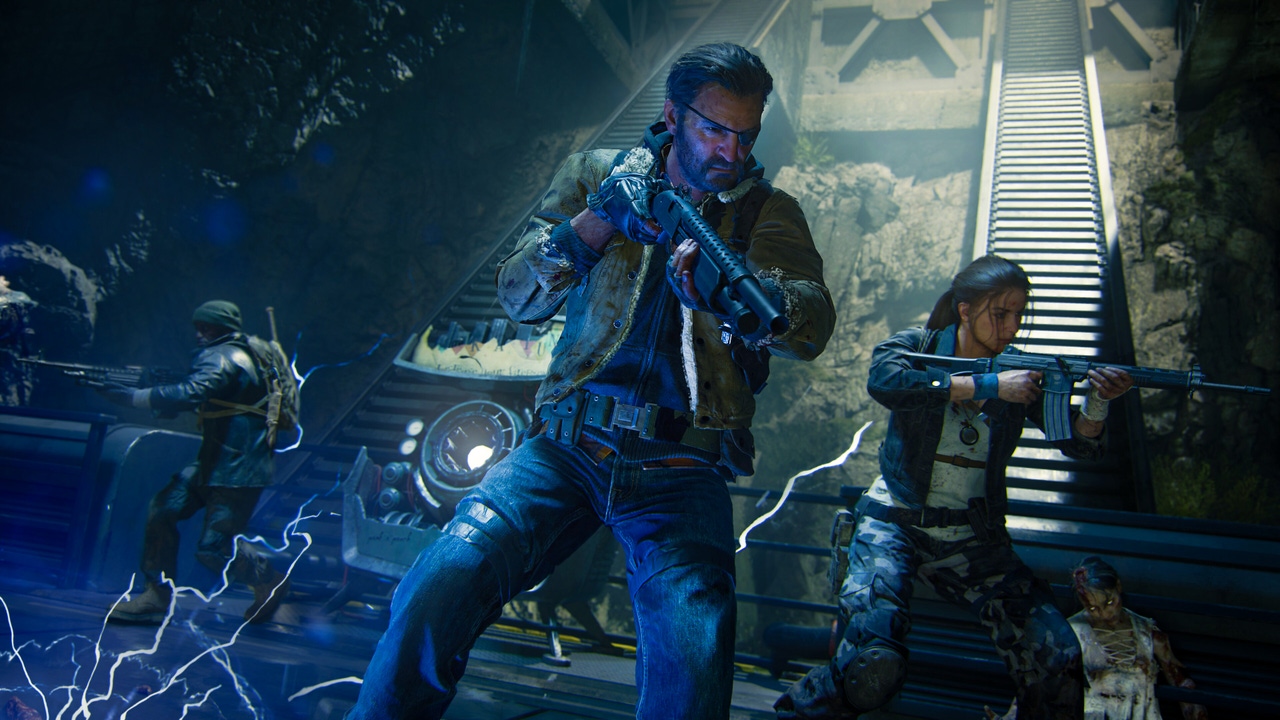Trending
Opinion: How will Project 2025 impact game developers?
The Heritage Foundation's manifesto for the possible next administration could do great harm to many, including large portions of the game development community.
Pre-release versions of Call of Duty: Black Ops 6 Zombies cutscenes contain different voiceover performances than those heard in the final game.

Call of Duty: Black Ops 6 developer and publisher Activision has acknowledged that it recast several characters in its "Zombies" mode in the wake of the ongoing SAG-AFTRA strike.
Questions over the recasting began swirling as updates to Black Ops 6 rolled out new missions with returning characters suddenly sounding quite different. Players noticed that the characters William Peck and Samantha Maxis—previously voiced respectively by Zeke Alton and Julie Nathanson—appeared by be played by new actors (Samantha Maxis appears in this game as an A.I character called "S.A.M.").
Alton does not appear in Black Ops 6's credits. Nathanson is listed, but she and the other named performers are not credited by their individual characters, making it difficult to pin down where their voices appear in the game. It's unclear if the voices behind characters from prior Zombies campaigns have also been recast.
Activision and Alton both acknowledged the recasting in statements to Game Developer—but careful language from both parties surrounding the "hows" and "whys" of the recasting speaks to the complicated reality of the SAG-AFTRA strike.
"To the best of my knowledge, that performance is not [mine]," Alton said when Game Developer asked if he reprised the role of Peck in Black Ops 6. "It's their character and they can do with it what they please. My only concern is for my brand as a performer. Fans of the game have reached out to me because the lack of crediting [of the replacement actor] implies that it may still be me which unfairly represents my abilities as a performer," he added.
"I have no issue with Activision's actions with a character and IP that they own. I absolutely adore the creative team and the opportunity I've had to collaborate with them in the past. I sincerely hope to collaborate in the future once all performers are protected against generative AI abuse."
In response to a request for comment, an Activision spokesperson provided the following statement: "We respect the personal choice of these performers. Out of respect for all parties, we won’t add new commentary about the ongoing negotiations with SAG-AFTRA. We look forward to a mutually beneficial outcome as soon as possible."
Though these comments offer some confirmation about the sudden voice swap in the long-running PvE zombie-slaying mode, it's fair to acknowledge come confusion here and ask what drove the change. Breaking down what might be going on begins with one fact: Call of Duty Black Ops 6 is not a struck production.
The ongoing SAG-AFTRA voice actors strike is more complicated than the film and television actors strike that preceded it in 2023. Under the terms of the film and television contract, actors on strike are legally able to stop work on an in-production shoot and not return to set. The Interactive Media Agreement signed in 2020 contains a unique clause known as "Side Letter Six" that allows actors to continue work on games under union contract so long as the game began production before the strike was called.
Call of Duty: Black Ops 6 was in development before July 25, 2024. That means it is exempt from the strike under Side Letter Six, and striking it would be in violation of the IMA. However SAG-AFTRA notes that members working under "daily contracts" on exempt productions may choose to "not sign a new contract" to show solidarity with striking union members. If they do so, recasting their characters would not be same as hiring replacement labor on a struck production (informally known as "scabbing").
Activision's referral to the "choice" of the performers may be alluding to their deciding to not sign a new daily contract after the strike began. The company may also not have chosen to offer a contract for other reasons.
Daily contracts on in-production games aren't the only ways developers can retain union talent. They can also sign what is known as the "Interim Interactive Media Agreement," which includes terms contained in the union's last offer to its bargaining partners. Over 80 game developers have signed the Interim Agreement since the strike began.
It is possible Activision chose to recast Peck, S.A.M, and other characters long before the strike began, but there's reason to think this isn't what took place. The most visible evidence of a mid-production recasting comes in the form of the intro cinematic for the level "Terminus." Reddit user "Heenix_" noticed that Peck's voice performance in the scene has changed between when Activision released the cinematic as a trailer in August before the release of Black Ops 6, and when it appeared in-game in November after it launched.
Game Developer independently reviewed the audio from both videos and confirmed Peck's voice sounds different between the two versions, and that the former version closely matches Alton's prior work.
But to repeat what Alton said above: the voice heard in the second scene from in Black Ops 6, to the best of his knowledge, is not his own.
Game Developer has reached out to Julie Nathanson and SAG-AFTRA for comment and will update this story when a response is issued.
You May Also Like